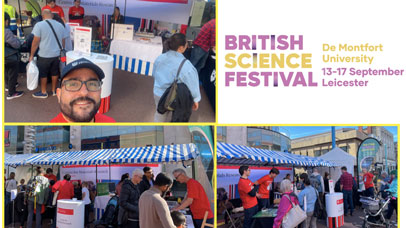Centre for Sustainable Materials Processing
Metal Heads at the British Science Festival

Researchers from the Centre of Material Research had an active role at the British Science Festival in Leicester hosting a drop-in activity called "Metal Heads", which allow the public to get hands on with minerals and metals.
The development of novel green technologies is essential to reduce greenhouse gases emissions and sustain a decarbonized future. For example, nickel cobalt, manganese and graphite are crucial to battery performance, longevity and energy density; rare earth elements are essential for permanent magnets used in wind turbines and electric vehicles motors; electricity networks need a huge amount of copper and aluminium. Therefore, a significant increase in metal consumption is expected in the upcoming years. Thus, the metallurgical industry must rely on sources of materials with lower metals contents from primary (e.g., mineral ores) and/or secondary (e.g., electronic waste) raw materials. Furthermore, the advancement towards the use of benign, cleaner and safer chemicals for the extraction of metals must sustain the development of sustainable processes.
In this context, the PhD students Evangelia Daskalopoulou and Sean Scot, alongside Dr Guillaume Zante, Dr Rodolfo Marin Rivera and Professor Gawen Jenkin, were showing to the public the complexity of extracting metals and their different applications, such as smartphones, solar panels, electrical vehicles, wind turbines. The activities presented by the scientists also showed how the outcome from the Material Centre is aiming to tackle these challenges by showing typical rocks containing valuable metals and, explaining and demonstrating how metals are extracted from mineral rocks and electronic wastes using biodegradable environmentally friendly solvents – the so-called Deep Eutectic Solvents.
Deep eutectic solvents (DESs) were discovered at the beginning of the 21st century in our research group in the University of Leicester. These chemicals are a cheap, greener and safer alternative to conventional solvents, making the DESs ideal tools for the recycling and extraction of metals. These chemicals could constitute the last step towards the industrial application of green and economically profitable metal extraction processes.